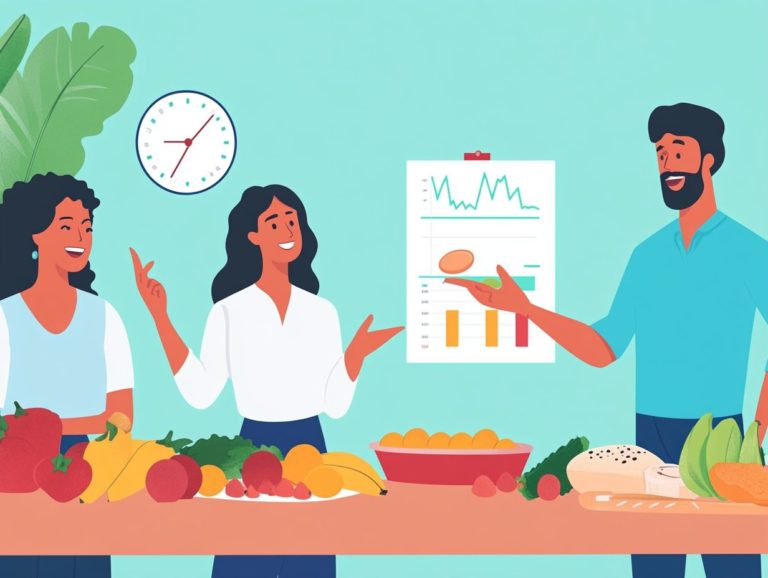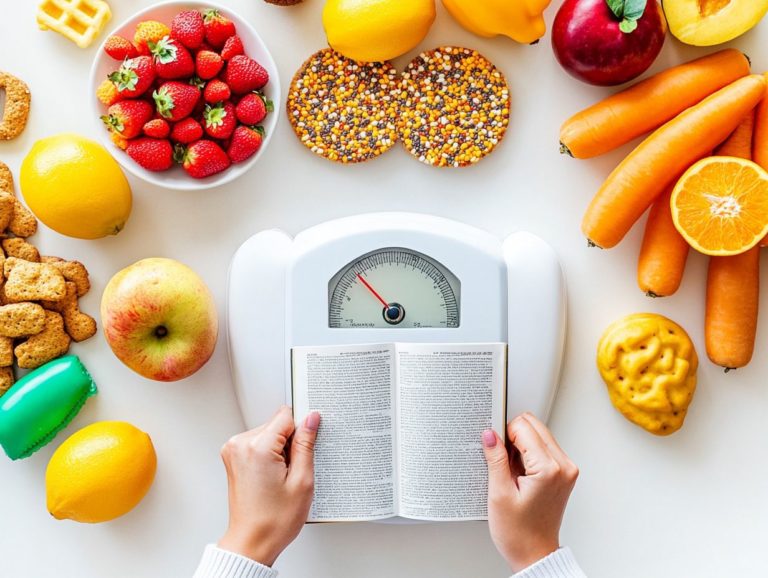5 Misconceptions About Eating Late at Night
Late-night snacking often carries many misconceptions that can cloud your understanding of your eating habits.
You might think that indulging in a snack after hours leads to weight gain and health problems. But is that really true?
This article delves into five common myths surrounding late-night eating, examining its effects on weight and sleep. It also highlights when late-night snacking shifts from a casual habit to a concern, explores potential benefits, and offers guidance on making healthier choices if you crave a midnight bite.
Dive in to uncover the reality behind these widespread beliefs and gain valuable insights on how to seamlessly incorporate late-night eating into a balanced lifestyle.
Contents
- Key Takeaways:
- 1. Eating Late at Night Causes Weight Gain
- 2. Late-Night Eating Leads to Poor Sleep
- 3. You Should Avoid Carbs at Night
- 4. Eating Late at Night Is Unhealthy
- 5. Late-Night Snacks Ruin Your Diet
- When Is ‘Late’ for Eating? Discover Your Ideal Timing!
- Preguntas Frecuentes
- Puedo perder peso evitando comer tarde en la noche?
- Es cierto que comer tarde en la noche causa problemas digestivos?
- Comer tarde en la noche afecta la calidad del sue o?
- Comer tarde en la noche me har ganar peso?
- Es malo para mi metabolismo comer tarde en la noche?
- Puede comer tarde en la noche llevar a antojos y comer en exceso?
Key Takeaways:
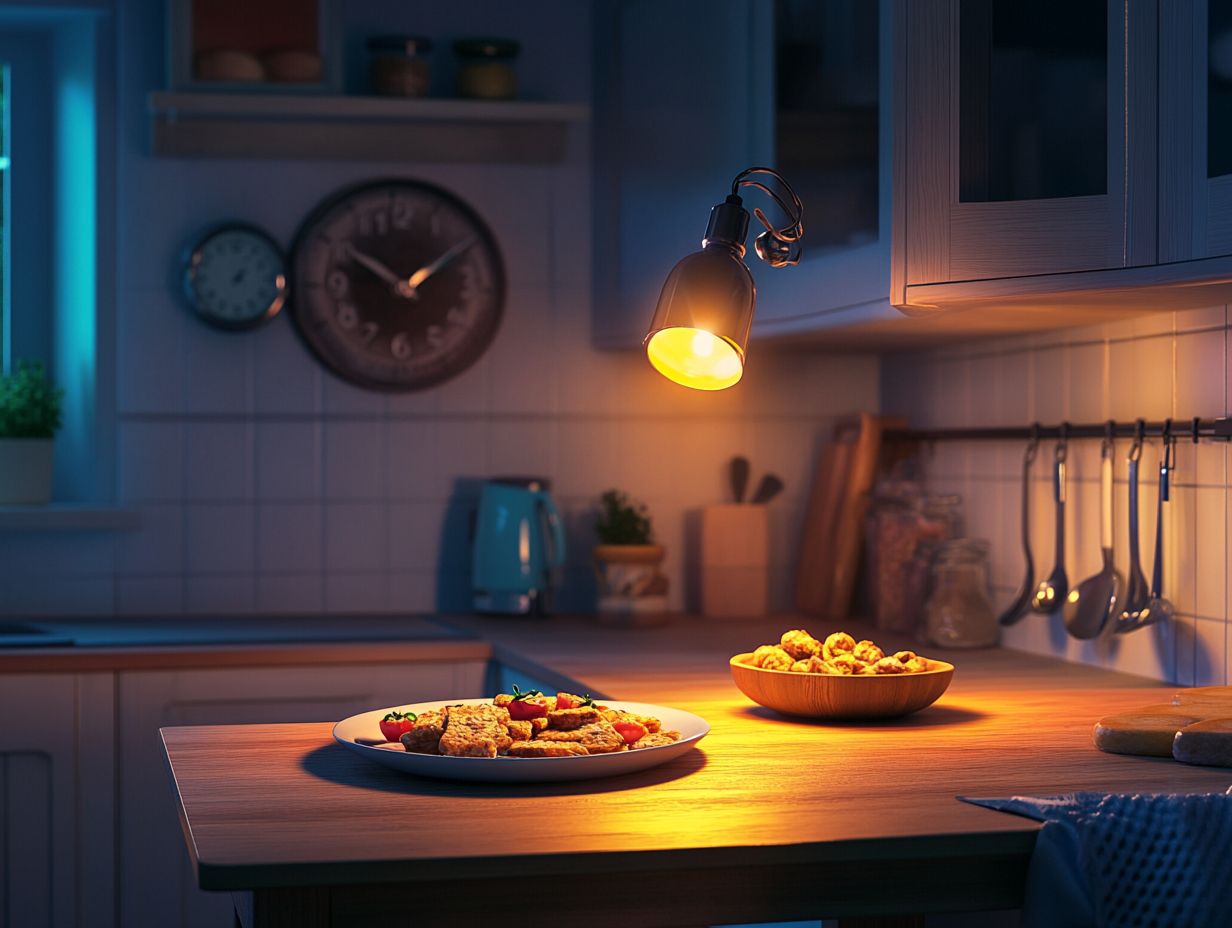
Eating late doesn’t cause weight gain.
Skipping meals or eating too little during the day can lead to late-night snacking and poor sleep.
Carbs aren’t off-limits at night; it’s all about portion control and choosing healthier options.
1. Eating Late at Night Causes Weight Gain
Eating dinner late often comes with the baggage of weight gain. Health experts emphasize that meal timing plays a crucial role in your overall calorie intake and metabolism.
If you re focused on managing your weight and refining your dietary patterns, late-night eating might raise some red flags.
Research shows that when you indulge in meals later in the evening, you may unintentionally ramp up your total calorie consumption. This often happens because people snack more while engaging in sedentary activities like watching TV or scrolling online. These habits can foster unhealthy eating behaviors and disrupt proper digestion.
Studies reveal that late-night dining frequently leads to poor food choices, with a tendency to gravitate toward foods high in calories but low in nutritional value, like chips.
Remember, quality matters! Choosing lighter, nutrient-rich foods in the evening can help you balance your caloric intake and support your metabolic health. This way, you can enjoy your late dinners without compromising your desired body weight and overall wellness.
2. Late-Night Eating Leads to Poor Sleep
Late-night eating can disrupt your sleep quality, as many health myths suggest. Stress and emotions often drive late-night cravings, affecting how well you sleep.
When you indulge in late-night meals, it s easy to overlook how these factors influence your decisions. Late-night snacks often become synonymous with comfort or convenience rather than nutritional value, creating a cycle of unhealthy eating habits.
Many believe that a simple snack before bed won t impact their sleep. Heavy or spicy foods can cause indigestion and restlessness. By understanding these nuances, you can make more informed choices about your evening meals, ultimately fostering healthier sleep patterns and enjoying more restful nights.
3. You Should Avoid Carbs at Night
Many dieting experts suggest that you should steer clear of carbohydrates at night. Excessive carb consumption, especially from unhealthy sources, can heighten late-night cravings and disrupt your nutritional balance.
This tendency stems from the fact that carbohydrates can spike your insulin levels, which may interfere with digestion and overall metabolism during those crucial nighttime hours.
It’s important to recognize that not all carbohydrates are created equal; they range from refined sugars found in sweets to complex carbohydrates like whole grains and legumes.
For healthy late-night snack options, consider indulging in a small serving of Greek yogurt paired with berries or a handful of nuts. Both choices offer essential nutrients without bombarding your body with excessive sugar.
Practicing portion control can amplify these benefits, promoting better sleep quality and supporting your weight management efforts as your body processes food more efficiently overnight.
Start making healthier late-night choices tonight!
4. Eating Late at Night Is Unhealthy
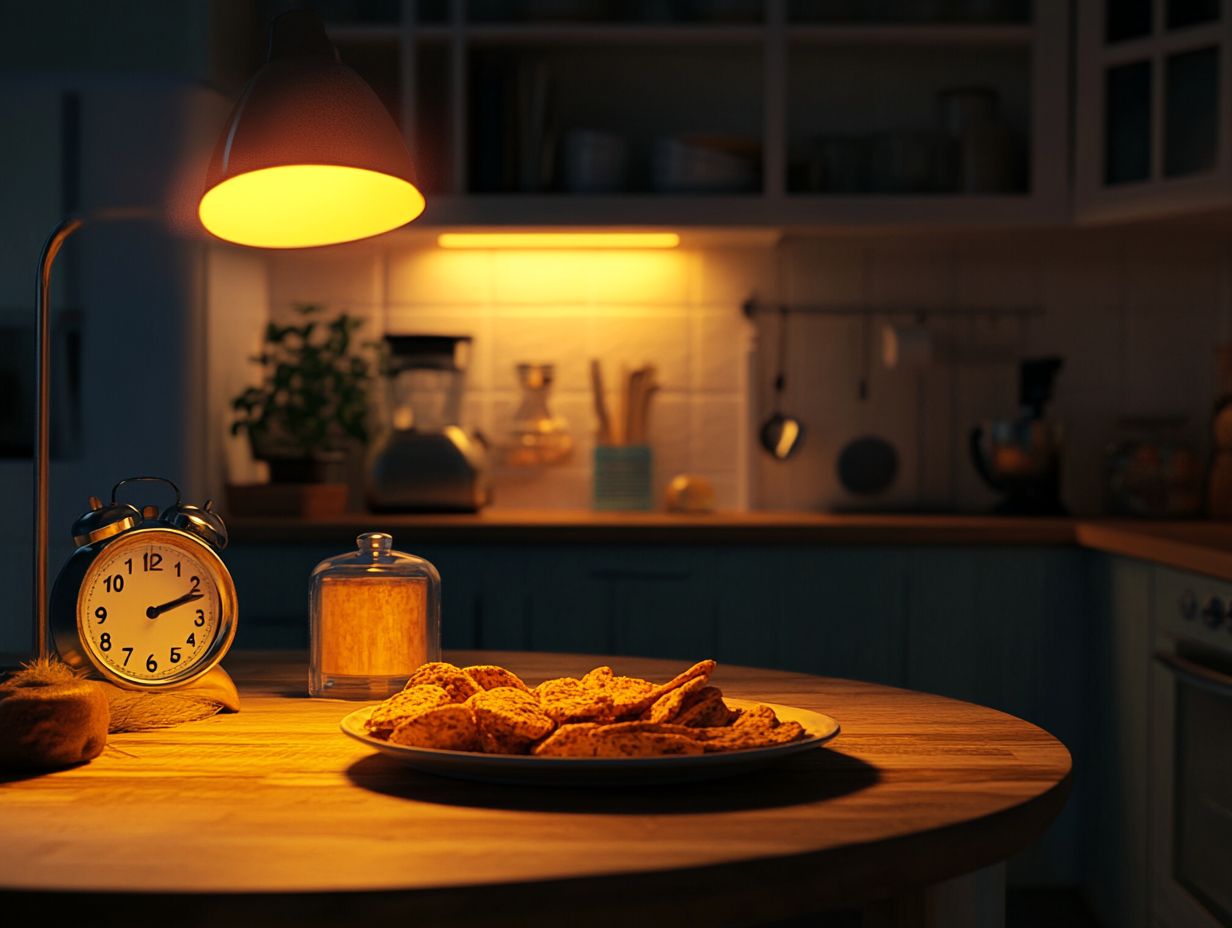
Late-night cravings can be hard to resist. When these cravings strike, it s easy to reach for convenience foods think chips or ice cream that are often high in sugars and fats. This habit increases calorie intake, making portion control difficult.
Processed foods often lose essential nutrients, leaving you with empty calories that don t truly satisfy your hunger. Snacking late at night can disrupt your sleep patterns and kickstart metabolic issues, complicating your weight loss journey even further.
Over time, these patterns can create a tough cycle of unhealthy eating and weight gain. Try swapping out those snacks for delicious, healthy alternatives to help you steer clear of this late-night trap.
5. Late-Night Snacks Ruin Your Diet
Many people think that late-night snacks are ultimate diet destroyers, easily pushing you over your calorie limit. However, this perspective overlooks the nuances of nighttime eating and its potential benefits in a balanced diet.
The truth is, not all snacks are created equal; opting for nutrient-dense (high in vitamins and minerals) choices can actually aid in weight loss instead of hindering it.
Research suggests that mindful nighttime snacking can help you manage hunger and prevent overeating the following day. Check out these tasty snacks that won’t sabotage your diet:
- Greek yogurt with berries
- Carrot sticks with hummus
- A handful of almonds
These options not only satisfy your cravings but also deliver essential nutrients, demonstrating that late-night bites don’t have to derail your dieting efforts.
When Is ‘Late’ for Eating? Discover Your Ideal Timing!
The concept of “late” when it comes to eating can vary greatly, shaped by cultural nuances and personal dining preferences. In Australia, for instance, dinner is typically served between 6 and 7 PM, aligning with a lifestyle that embraces earlier evenings.
In contrast, families in Argentina often gather for dinner around 9 PM or later, encouraging a more relaxed approach to nighttime dining. Spain takes this a step further; locals may not even sit down to eat until 10 PM, reveling in a culture that celebrates long, festive evenings filled with lively conversation and delectable tapas.
These variations highlight different lifestyles and influence late-night eating habits, with social gatherings frequently extending well into the night.
What Are the Benefits of Eating Late at Night?
Eating late at night may actually present several advantages for you. It can enhance energy expenditure if you have an evening appetite and potentially optimize meal timing for night owls.
By aligning your eating habits with your personal schedule, you can significantly boost your well-being. Late-night meals can provide crucial nourishment, especially for those engaged in unconventional work hours or late-night exercise routines.
By prioritizing the nutritional quality of your late-night options think whole grains, lean proteins, and healthy fats you can effectively address concerns about weight gain and poor digestion.
This mindful approach allows you to enjoy a balanced intake that supports your energy needs while cultivating a healthy relationship with food. You won t believe how beneficial it can be!
What Are Some Healthy Late-Night Snack Options?
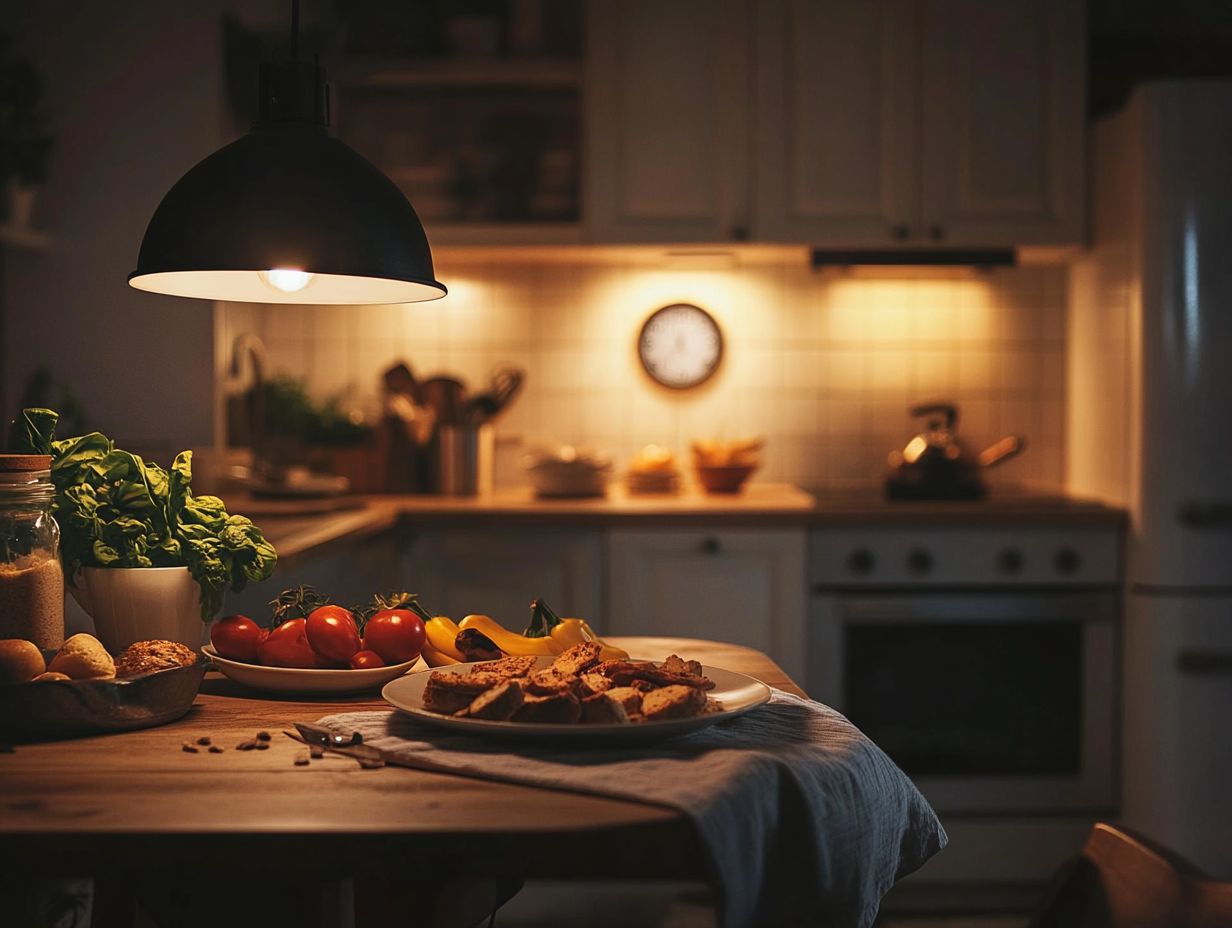
When late-night cravings hit, choose healthy snacks that satisfy your taste while meeting your nutritional needs. Focus on portion control and opt for whole foods that provide lasting energy without too many calories.
A delightful option is a small serving of Greek yogurt topped with fresh berries. This tasty treat combines protein and antioxidants.
You can also enjoy a small bowl of air-popped popcorn seasoned with your favorite herbs. It s crunchy and guilt-free due to its high fiber content.
Another great choice is a few slices of avocado on whole-grain toast. This option is packed with healthy fats and essential nutrients. These snacks will curb your hunger while supporting your overall health.
How Can One Incorporate Late-Night Eating into a Healthy Lifestyle?
Making late-night eating part of a healthy lifestyle is achievable with mindful meal timing and calorie control. This ensures your late meals align with your weight management goals.
Prioritize nutrient-rich foods that are high in vitamins and minerals over empty calories. Lighter options like salads, whole grains, or lean proteins can significantly boost your health.
Practice portion control by using smaller plates or pre-measured snacks to avoid overeating. Staying aware of your daily calorie budget allows for flexibility in meal planning while still supporting your goals.
By adopting these smart late-night strategies, you can enjoy a satisfying meal without jeopardizing your health objectives.
What Are the Possible Risks of Eating Late at Night?
Eating late at night can lead to several risks, including weight gain and disrupted dietary patterns. Experts warn about the psychological factors that can trigger unhealthy eating habits.
When snacking at night, you may ignore true hunger cues and choose less nutritious options, increasing your caloric intake. This can create a cycle where stress or boredom is tied to eating.
Physiological effects can include poor digestion and disrupted sleep patterns, which may worsen health issues over time.
To mitigate these risks, adopt mindful eating practices, set a cut-off time for meals, and explore healthier alternatives. These strategies help cultivate better habits and enhance overall well-being.
What Are Some Tips for Managing Late-Night Cravings?
Managing late-night cravings is vital for a healthy diet. You can use effective strategies like practicing portion control, choosing healthy snacks, and following good dieting advice to keep your calorie intake in check.
Incorporating meal planning into your routine helps you select wholesome options that satisfy your hunger without derailing your health goals.
Keep a variety of nutritious snacks handy such as fresh fruit, nuts, or yogurt to help resist the temptation of unhealthy choices.
Being mindful of when you eat and recognizing true hunger signals is essential. Over time, these practices will meet your nutritional needs and foster a healthier relationship with food.
Preguntas Frecuentes
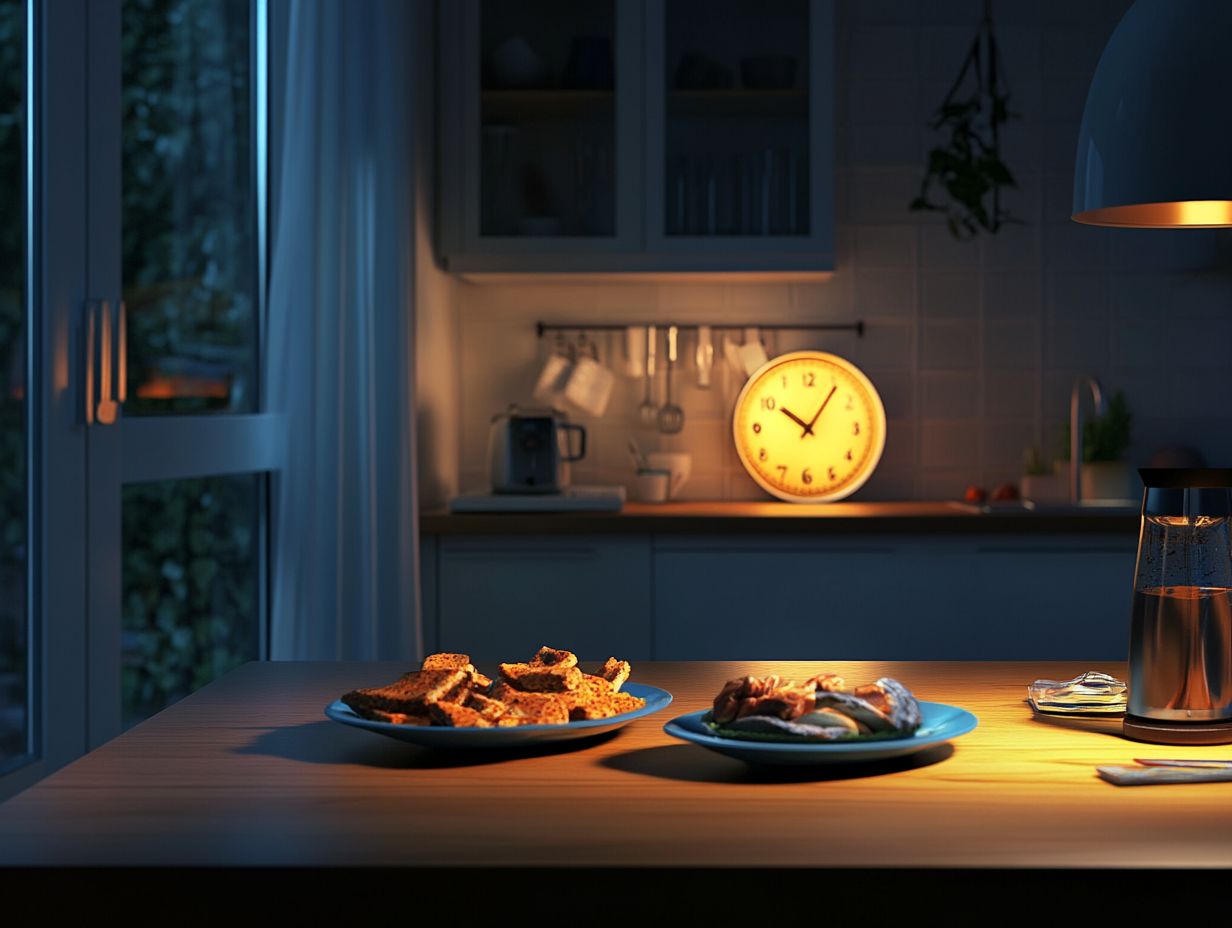
Puedo perder peso evitando comer tarde en la noche?
Muchos creen que comer tarde en la noche causa aumento de peso. Sin embargo, la p rdida de peso depende de la cantidad total de comida que comes, no solo del momento en que comes.
Comer de forma saludable durante el d a es clave para perder peso. M s que evitar comer por la noche, elige alimentos equilibrados en cada comida.
Es cierto que comer tarde en la noche causa problemas digestivos?
Muchas personas piensan que comer tarde en la noche puede causar problemas digestivos, como indigesti n y acidez estomacal. Pero, en realidad, estos problemas dependen m s de lo que comes que de cu ndo comes.
Comer alimentos pesados, grasosos o picantes cerca de la hora de dormir puede provocar malestar. As que, ten cuidado con lo que eliges antes de ir a la cama!
Comer tarde en la noche afecta la calidad del sue o?
Se suele creer que comer tarde interrumpe el sue o y provoca noches inquietas. Aunque una comida pesada puede dificultar el sue o, un refrigerio ligero y equilibrado puede ayudar.
Los carbohidratos como las galletas o las frutas pueden aumentar la producci n de serotonina, una sustancia que ayuda a sentirse relajado y dormir mejor.
Comer tarde en la noche me har ganar peso?
Otra idea err nea es que comer tarde autom ticamente provoca aumento de peso. Sin embargo, el aumento de peso ocurre cuando consumes m s calor as de las que tu cuerpo necesita, sin importar la hora del d a.
Escucha a tu cuerpo y elige opciones saludables! No importa la hora, lo que cuenta es c mo te alimentas.
Es malo para mi metabolismo comer tarde en la noche?
Muchos creen que comer tarde reduce el metabolismo y causa aumento de peso. Sin embargo, no hay evidencia que respalde esta afirmaci n.
Nuestros cuerpos digieren y metabolizan los alimentos todo el tiempo, sin importar la hora. Lo que realmente importa es la calidad y cantidad total de alimentos que consumes.
Puede comer tarde en la noche llevar a antojos y comer en exceso?
A menudo se dice que comer tarde puede causar antojos y comer en exceso. Sin embargo, esto no siempre es cierto.
Los antojos y el comer en exceso pueden ocurrir en cualquier momento, dependiendo de factores como el estr s o las emociones. Comer comidas y refrigerios equilibrados durante el d a puede ayudarte a regular el hambre y prevenir el exceso, sin importar la hora.


